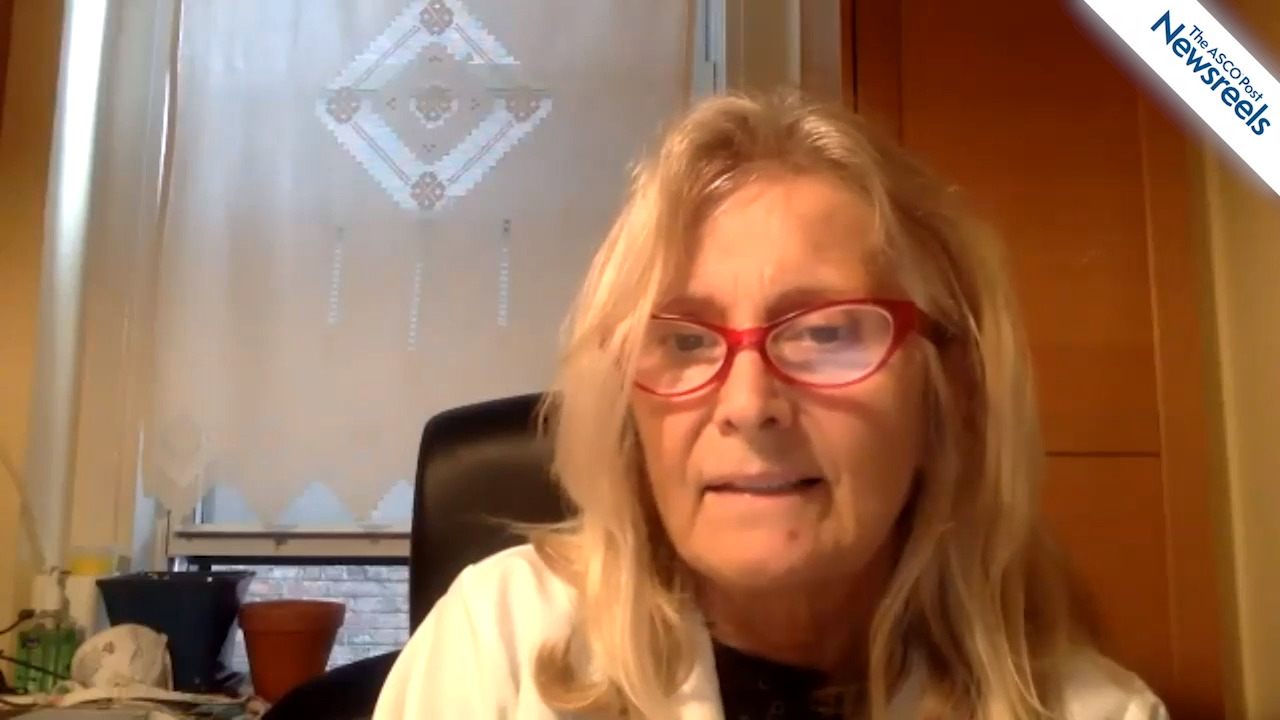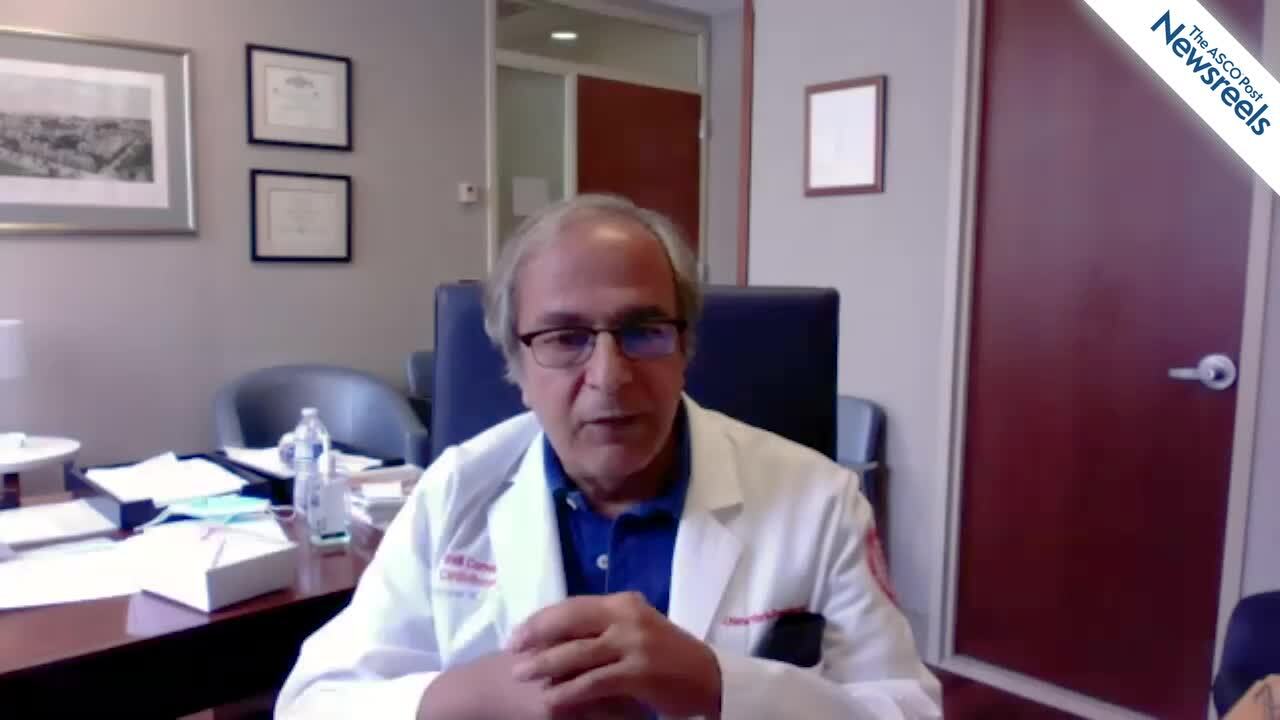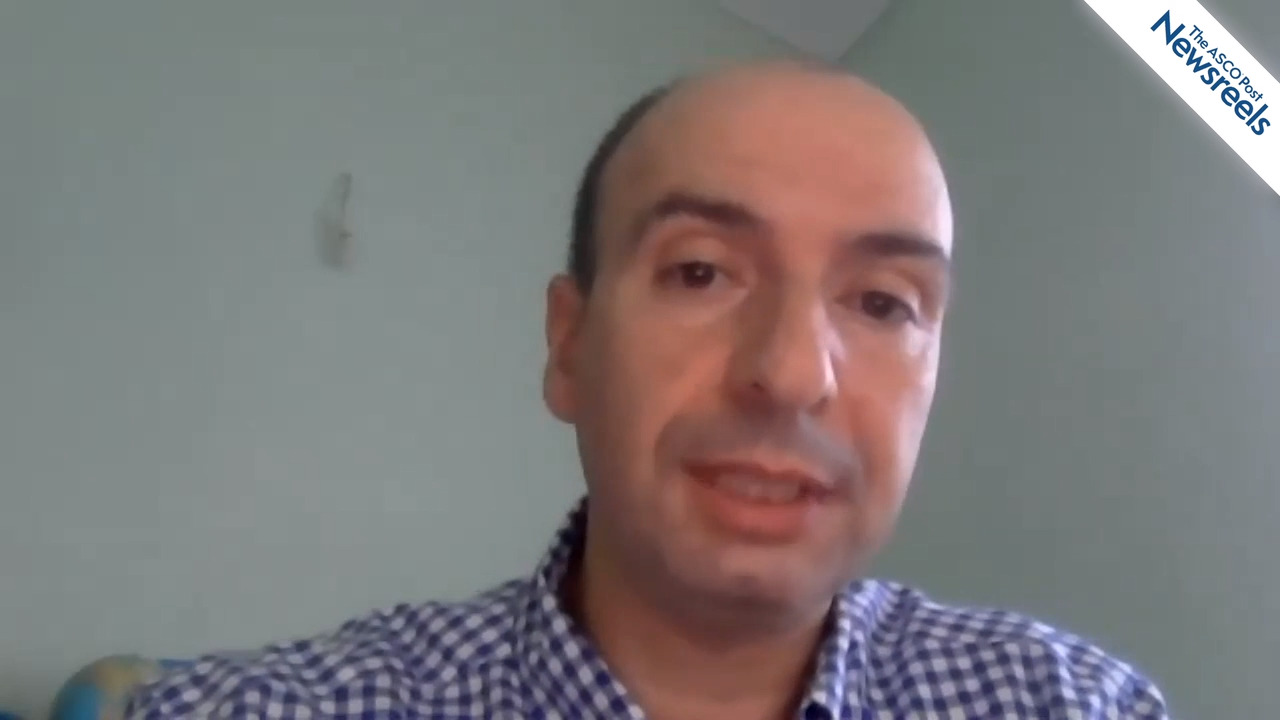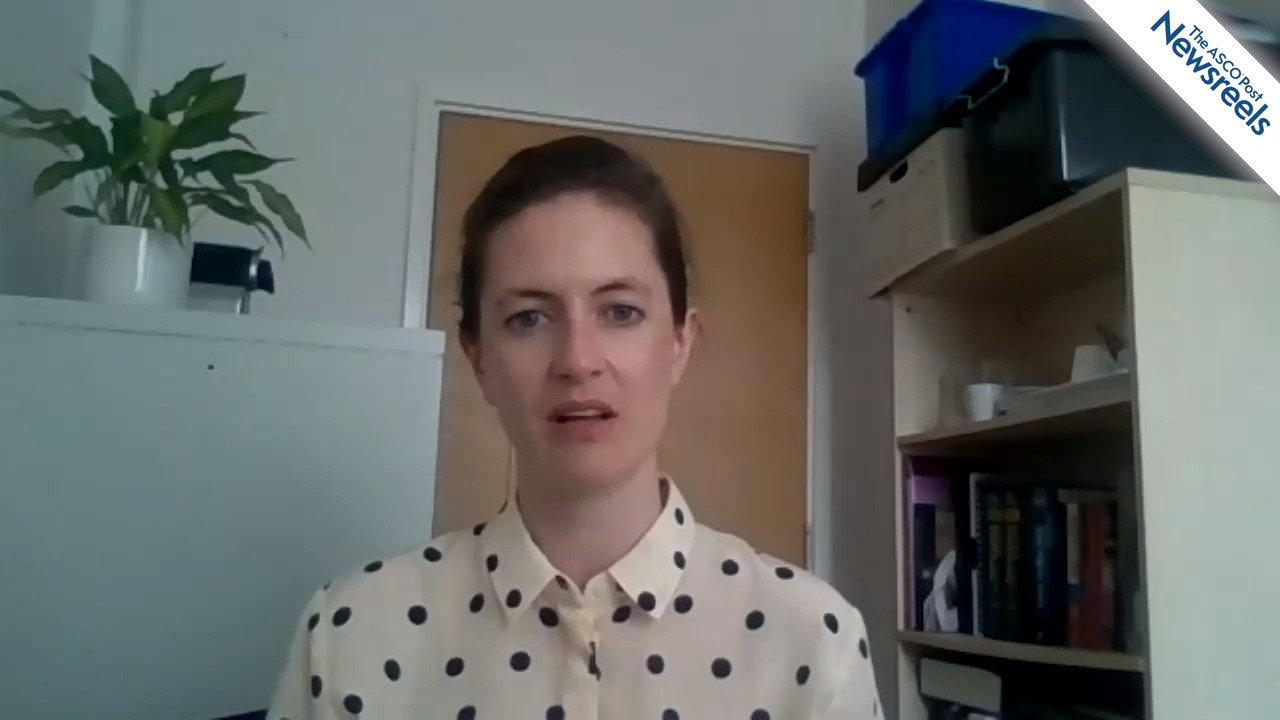Combination Immunotherapy in Advanced Biliary Tract Cancers
In a subgroup analysis of an Australian phase II trial reported in JAMA Oncology, Klein et al found that the combination of nivolumab and ipilimumab was active in patients with advanced biliary tract cancers. Study Details The phase II trial is enrolling patients with advanced rare cancers. The...
Anti-CD30 CAR T-Cell Therapy for Patients With Relapsed or Refractory Hodgkin Lymphoma
In a pooled analysis of two parallel single-center phase I/II studies reported in the Journal of Clinical Oncology, Ramos et al found that anti-CD30 chimeric antigen receptor (CAR) T-cell therapy produced responses in a high proportion of patients with relapsed or refractory Hodgkin lymphoma. As...
FDA Grants Accelerated Approval to Belantamab Mafodotin-blmf for Pretreated Patients With Relapsed or Refractory Multiple Myeloma
On August 5, the U.S. Food and Drug Administration (FDA) granted accelerated approval to belantamab mafodotin-blmf (Blenrep), an anti-B-cell maturation antigen antibody-drug conjugate, for adult patients with relapsed or refractory multiple myeloma who have received at least four prior therapies,...
ASCO Guideline Supports Continued Use of Dexamethasone for Patients Receiving Checkpoint Inhibitors and Emetogenic Chemotherapy
The ASCO guideline on the use of antiemetics has been updated to include new anticancer agents, antiemetics, and regimens.1 The guideline also addresses a growing concern among some oncologists that corticosteroids and their immunosuppressive abilities could potentially compromise the efficacy of...
Ralph R. Weichselbaum, MD, on Radiotherapy and Immunotherapy in Oligometastatic Disease
Ralph R. Weichselbaum, MD, of the University of Chicago Cancer Research Center, explores the question of whether radiotherapy is the principal curative treatment with immunotherapy or activates immunotherapy. He also discussed how to improve the interaction of these treatments, perhaps with vaccination, transfer of genetically engineered T cells, or checkpoint inhibitors (Session ED37).
Silvia Formenti, MD, on Testing Radiation and Immune Checkpoint Blockade in Different Tumor Settings
Silvia Formenti, MD, of Weill Cornell Medical College, discusses her continuing work, and the promising results emerging, in combining radiotherapy with immunotherapy to boost abscopal response rates. This combination therapy extends the use of radiotherapy to promote antitumor T-cell responses for both local and metastatic disease (Session ED37).
FDA Approves Atezolizumab Plus Cobimetinib/Vemurafenib for Advanced BRAF V600–Mutated Melanoma
On July 30, the U.S. Food and Drug Administration (FDA) approved the PD-L1 inhibitor atezolizumab (Tecentriq) plus the MEK inhibitor cobimetinib (Cotellic) and the selective BRAF kinase inhibitor vemurafenib (Zelboraf) for the treatment of patients with advanced BRAF V600 mutation–positive...
Pembrolizumab in Recurrent or Metastatic Cutaneous Squamous Cell Carcinoma
As reported in the Journal of Clinical Oncology by Grob et al, the first interim analysis of the phase II KEYNOTE-629 trial has shown that treatment with pembrolizumab resulted in durable responses in patients with recurrent or metastatic cutaneous squamous cell carcinoma. The study supported the...
Anti-TIGIT Antibody Plus Atezolizumab Move Forward in Advanced NSCLC
Tiragolumab, an anti-TIGIT antibody, plus the PD-L1 inhibitor atezolizumab exhibited early clinical activity and was tolerated in patients with advanced solid tumors, including those with metastatic non–small cell lung cancer (NSCLC) that was PD-L1–positive and untreated with prior checkpoint...
CANDOR Trial: Carfilzomib, Dexamethasone, and Daratumumab vs Carfilzomib and Dexamethasone in Patients With Relapsed or Refractory Multiple Myeloma
As reported in The Lancet by Meletios Dimopoulos, MD, and colleagues, the phase III CANDOR trial has shown prolonged progression-free survival with carfilzomib, dexamethasone, and daratumumab (KdD) vs carfilzomib and dexamethasone (Kd) in patients with relapsed or refractory multiple myeloma....
Combination Immunotherapy Approaches
In this video, Drs. Ramalingam, Brahmer, and Wakelee discuss the latest in emerging data on chemo/immunotherapy and immunotherapy-based combination approaches for the treatment of non–small cell lung cancer. They review recent data presented during the ASCO20 Virtual Scientific Program, including CheckMate 227 and CheckMate 9LA, as well as the associated clinical implications.
FDA Approves Brexucabtagene Autoleucel for Relapsed or Refractory Mantle Cell Lymphoma
On July 24, the U.S. Food and Drug Administration (FDA) granted accelerated approval to brexucabtagene autoleucel (Tecartus), a CD19-directed genetically modified autologous T-cell immunotherapy, for the treatment of adult patients with relapsed or refractory mantle cell lymphoma. “Tremendous...
Role of Rituximab in the Treatment of Children and Adolescents With Mature B-Cell Non-Hodgkin Lymphoma
Minard-Colin et al recently reported for the European Intergroup for Childhood Non-Hodgkin Lymphoma/Children’s Oncology Group (EICNHL/COG) a significant improvement in event-free survival among children and adolescents (aged 6 months to 18 years) with high-risk mature B-cell non-Hodgkin lymphoma...
Addition of Rituximab to Standard Chemotherapy Improves Event-Free and Overall Survival in Children With High-Risk, Mature B-Cell Non-Hodgkin Lymphoma
In a European Intergroup for Childhood Non-Hodgkin Lymphoma/Children’s Oncology Group phase III trial reported in The New England Journal of Medicine, Véronique Minard‑Colin, MD, PhD, of Gustave Roussy, Université Paris-Saclay, Villejuif, France, and colleagues found that the addition of rituximab...
Nivolumab in Previously Treated Esophageal Squamous Cell Carcinoma
On June 10, 2020, nivolumab was approved for treatment of patients with unresectable, advanced, recurrent, or metastatic esophageal squamous cell carcinoma after prior fluoropyrimidine- and platinum-based chemotherapy.1,2 Supporting Efficacy Data Approval was based on findings from the open-label,...
Pembrolizumab for Adult and Pediatric Patients With Tumor Mutational Burden–High Solid Tumors
In the Clinic provides overviews of novel oncology agents, addressing indications, mechanisms of action, administration recommendations, safety profiles, and other essential information needed for the appropriate clinical use of these drugs. On June 16, 2020, pembrolizumab was granted accelerated...
Small Study Evaluates Neoadjuvant vs Adjuvant Nivolumab Plus Ipilimumab in Stage III Melanoma
The neoadjuvant combination of nivolumab and ipilimumab yielded a continued benefit in relapse-free survival vs adjuvant use of the same combination therapy in 20 patients with stage III macroscopic melanoma. This finding is based on 3-year follow-up results of the phase Ib OpACIN trial, presented...
Can Radiomics Predict Survival in Patients With NSCLC Receiving Immunotherapy?
Immunotherapy with immune checkpoint inhibitors has made great strides in the treatment of many cancers, but only between 25% and 50% of patients respond with clinical benefit, and these agents come with adverse events and high price tags. Thus, preselection of patients who are likely to respond to ...
T-DM1 in Patients With HER2-Positive Breast Cancer and Brain Metastases: KAMILLA Trial
An exploratory subgroup analysis of the KAMILLA trial represents the largest reported cohort of patients with HER2-positive breast cancer and brain metastases treated with the anti-HER2 antibody-drug conjugate ado-trastuzumab emtansine, or T-DM1, in a prospective setting. Researchers observed...
Outcomes With Axicabtagene Ciloleucel in the Nontrial Setting in Patients With B-Cell Non-Hodgkin Lymphoma
In a study reported in the Journal of Clinical Oncology, Caron A. Jacobson, MD, and colleagues found that commercial use of the chimeric antigen receptor T-cell therapy axicabtagene ciloleucel in patients with relapsed or refractory B-cell non-Hodgkin lymphoma was associated with an overall...
Nasser K. Altorki, MD, on Lung Cancer: Radiotherapy and Immune Checkpoint Blockade in the Neoadjuvant Setting
Nasser K. Altorki, MD, of Weill Cornell Medical College, discusses study findings that suggest neoadjuvant low-dose focal stereotactic body radiation plus immune checkpoint blockade (ICB) is safe and causes no surgical delays in early-stage lung cancer, and that major pathologic response rates are likely to be comparable to those with chemotherapy/ICB combinations (Session ED37).
Margetuximab/Pembrolizumab for Previously Treated Patients With HER2-Positive Advanced Gastroesophageal Adenocarcinoma
In a phase Ib/II trial reported in The Lancet Oncology, Daniel V.T. Catenacci, MD, and colleagues found that the combination of margetuximab and the anti–PD-1 therapy pembrolizumab showed evidence of activity in patients with previously treated HER2-positive gastroesophageal adenocarcinoma. As...
FDA Pipeline: Novel Treatments for Hematologic Malignancies
Recently, the U.S. Food and Drug Administration (FDA) granted Priority Review to pembrolizumab for the second-line treatment of patients with relapsed or refractory Hodgkin lymphoma, and also accepted a supplemental new drug application for selinexor for pretreated patients with multiple myeloma....
Pembrolizumab for Advanced Melanoma: Impact of BRAF-Mutation Status and Prior Therapeutic Regimens
In a pooled analysis reported in JAMA Oncology, Igor Puzanov, MD, MSCI, and colleagues identified objective response rates and progression-free and overall survival rates with pembrolizumab treatment among patients with advanced melanoma according to BRAF V600E/K–mutation status and prior BRAF/MEK...
Phase Ib Trial of Atezolizumab With or Without Bevacizumab in Patients With Unresectable Hepatocellular Carcinoma
The combination of atezolizumab and bevacizumab was recently approved by the U.S. Food and Drug Administration for the treatment of unresectable or metastatic hepatocellular carcinoma on the basis of findings from the phase III IMbrave150 trial, which showed superior overall and progression-free...
Study Identifies Factors That May Predict Toxicities in Patients Treated With CAR T-Cell Therapy
Chimeric antigen receptor (CAR) T-cell therapy has proved to be a valuable treatment option for patients with lymphoma in whom other therapies have failed. In clinical trials, the cellular immunotherapy was shown to provide durable remissions for nearly 40% of patients with large B-cell lymphoma....
Two Studies Focus on Emerging Treatment Options for Patients With Neuroendocrine Tumors
Two new studies led by Renuka Iyer, MD, Section Chief for Gastrointestinal Oncology at Roswell Park Comprehensive Cancer Center, and published in Oncotarget and Cancer, respectively, highlight possible new treatment options for patients with neuroendocrine tumors. SurVaxM The first report,...
Potential Association of Impaired Spermatogenesis and Immune Checkpoint Inhibitor Therapy in Patients With Metastatic Melanoma
In a study reported as a research letter in JAMA Oncology, Scovell et al identified a potential association between the use of immune checkpoint inhibitors and impaired spermatogenesis using autopsy tissue findings in men with a history of metastatic melanoma. Study Details The study involved...
Atezolizumab Plus Bevacizumab for Unresectable or Metastatic Hepatocellular Carcinoma
On May 29, 2020, atezolizumab in combination with bevacizumab was approved for treatment of patients with unresectable or metastatic hepatocellular carcinoma who have not received prior systemic therapy.1-3 Supporting Efficacy Data Approval was based on findings in the international, open-label,...
IMbrave150: A New Standard of Care to Treat Hepatocellular Cancers?
In 2007, sorafenib became the first approved systemic therapy for hepatocellular cancers and the first agent to improve overall survival in these patients.1 In a similar multikinase inhibitor strategy, lenvatinib was found to be noninferior to sorafenib in overall survival in the same patient...
Expert Point of View: Daniel Y. Heng, MD, MPH, and Toni K. Choueiri, MD
Study discussant Daniel Y. Heng, MD, MPH, a medical oncologist at Tom Baker Cancer Centre, University of Calgary, Canada, called the negative trial results important. IMvigor010 randomly assigned patients with high-risk muscle-invasive urothelial carcinoma to adjuvant atezolizumab or observation...
Adjuvant Atezolizumab Fails to Meet Primary Study Endpoint in High-Risk Bladder Cancer
Adjuvant atezolizumab, a PD-L1–blocking antibody, failed to meet the primary endpoint of disease-free survival in patients at high risk of recurrence of muscle-invasive bladder cancer compared with observation alone, according to the primary analysis of the IMvigor010 trial reported during the...
Expert Point of View: Suzanne Lentzsch, MD, PhD, and Joshua Richter, MD
Two myeloma specialists weighed in on the disappointing findings of SWOG S1211: Suzanne Lentzsch, MD, PhD, Professor of Medicine at Columbia University and Director of the Multiple Myeloma and Amyloidosis Service, and Joshua Richter, MD, Assistant Professor of Medicine, Icahn School of Medicine at...
Elotuzumab Fails to Add Benefit in Newly Diagnosed High-Risk Myeloma
The addition of elotuzumab to a standard three-drug induction regimen did not improve outcomes in patients with high-risk multiple myeloma enrolled in the randomized phase II SWOG S1211 trial, according to findings reported during the ASCO20 Virtual Scientific Program by Saad Zafar Usmani, MD,...
Roundup of High-Impact Studies in Early Breast Cancer
Clinicians interested in breast cancer who logged into the ASCO20 Virtual Scientific Program were greeted with an abundance of high-impact presentations. The ASCO Post has reported on several studies in depth elsewhere, but here we offer our readers a roundup of several important studies in early...
IMbrave150 Trial: Atezolizumab Plus Bevacizumab Improves Survival in Unresectable Hepatocellular Carcinoma
As reported in The New England Journal of Medicine by Richard S. Finn, MD, of Jonsson Comprehensive Cancer Center, Geffen School of Medicine at the University of California, Los Angeles, and colleagues, the phase III IMbrave150 trial has shown that anti–programmed cell death ligand 1 (PD-L1) plus...
Expert Point of View: Philip McCarthy, MD
Philip McCarthy, MD, Professor of Oncology and Internal Medicine and Director of the Transplant and Cellular Therapy Center at Roswell Park Comprehensive Cancer Center, Buffalo, New York, found the results of the DREAMM-6 study to be “exciting and promising.” He commented: “The overall response...
Responses Achieved With Belantamab Mafodotin in Relapsed or Refractory Myeloma
The antibody-drug conjugate belantamab mafodotin yielded responses as a single agent and in combination with bortezomib and dexamethasone in the treatment of relapsed or refractory multiple myeloma, according to two reports from the DREAMM team at the ASCO20 Virtual Scientific Program.1,2 In the...
Phase II Study Evaluates Chemotherapy and Immunotherapy in Patients With Malignant Pleural Mesothelioma
Data from the phase II PrE0505 multicenter trial showed that adding durvalumab, an immune checkpoint antibody targeting programmed cell death ligand 1 (PD-L1), to the combination of cisplatin and pemetrexed chemotherapy improved outcomes in previously untreated patients with unresectable malignant...
New NCCN Guidelines Offer Patients Help in Recognizing Side Effects From Immunotherapy
The National Comprehensive Cancer Network (NCCN) recently announced the publication of “NCCN Guidelines for Patients: Immunotherapy Side Effects—Immune Checkpoint Inhibitors.” These new guidelines are designed to educate patients and to help them recognize immune side effects so effective...
Efstathios Kastritis, MD, on Amyloidosis: Daratumumab Plus Cyclophosphamide, Bortezomib, and Dexamethasone
Efstathios Kastritis, MD, of the University of Athens, discusses phase III findings of the Andromeda study. Adding daratumumab to cyclophosphamide, bortezomib, and dexamethasone resulted in deeper and more rapid hematologic responses and improved clinical outcomes in patients with newly diagnosed light chain amyloidosis (Abstract LB2604).
Addition of Trastuzumab to Carboplatin/Paclitaxel for Advanced or Recurrent HER2-Positive Uterine Serous Carcinoma
Combining the HER2-targeted therapy trastuzumab with carboplatin and paclitaxel improved survival rates for women with a rare, aggressive type of endometrial cancer, according to findings published by Fader et al in Clinical Cancer Research. Each year, more than 65,650 women in the United States...
Elizabeth H. Phillips, MD, on DLBCL: Inotuzumab Ozogamicin Plus Chemotherapy in Front-Line Setting
Elizabeth H. Phillips, MD, of the University of Manchester and The Christie Hospital, discusses phase II findings showing inotuzumab ozogamicin plus rituximab, cyclophosphamide, vincristine, and prednisolone is a feasible and effective regimen for front-line treatment of high-risk patients with diffuse large B-cell lymphoma who are not eligible for standard chemotherapy (Abstract S232).
Longer-Term Results of Pivotal Study in Advanced Cutaneous Squamous Cell Carcinoma
New, longer-term data from a pivotal phase II trial in advanced cutaneous squamous cell carcinoma (CSCC), were presented during the ASCO20 Virtual Scientific Program and discussed during a poster discussion.1 Danny Rischin, MD, of the Peter MacCallum Cancer Centre, Victoria, Australia, presented...
Final Analysis of Phase II Trial in Recurrent Platinum-Sensitive Ovarian Cancer
In a poster presentation at the ASCO20 Virtual Scientific Program, Mansoor Raza Mirza, MD, of the the Department of Oncology, Rigshopitalet, Copenhagen University Hospital, Denmark, and colleagues reported the final analysis of the phase II NSGO-AVANOVA2/ENGOT-OV24 trial comparing the...
Expert Point of View: TROPHIMMUN Trial
Two gynecologic oncologists and ASCO’s Chief Medical Officer and Executive Vice President Richard L. Schilsky, MD, FACP, FSCT, FASCO, commented on the findings of the TROPHIMMUN trial for The ASCO Post. “The authors demonstrate efficacy of a new treatment approach for gestational trophoblastic...
Avelumab Shown Effective in Rare Chemotherapy-Resistant Gynecologic Tumor in TROPHIMMUN Trial
Almost 50% of patients resistant to single-agent chemotherapy responded in the first trial of immunotherapy for gestational trophoblastic tumors, reported French investigators in an abstract presented during the ASCO20 Virtual Scientific Program.1 Benoit You, MD, PhD, of Lyon University Hospital,...
Expert Point of View: Scott N. Gettinger, MD
Discussant for the CheckMate 227 and CheckMate 9LA trials, Scott N. Gettinger, MD, of Yale Cancer Center in New Haven, Connecticut, said: “There is tremendous interest in lung cancer to combine nivolumab plus ipilimumab, driven by the melanoma experience. However, combinations of immunotherapy come ...
First-Line Nivolumab Plus Ipilimumab Shows Activity in NSCLC, With or Without Chemotherapy
Advanced non–small cell lung cancer (NSCLC) in patients whose tumors have no EGFR or ALK alterations poses a particular challenge in terms of first-line therapy. The use of nivolumab plus ipilimumab as well as nivolumab/ipilimumab plus two cycles of chemotherapy, respectively, as first-line therapy ...
Pembrolizumab Improves Progression-Free Survival vs Brentuximab Vedotin in Patients With Relapsed/Refractory Classical Hodgkin Lymphoma
Treatment with the anti–PD-1 agent pembrolizumab significantly improved progression-free survival in patients with classical Hodgkin lymphoma compared with standard brentuximab vedotin, according to results of the phase III KEYNOTE-204.1 The study results were presented during the ASCO20 Virtual...






